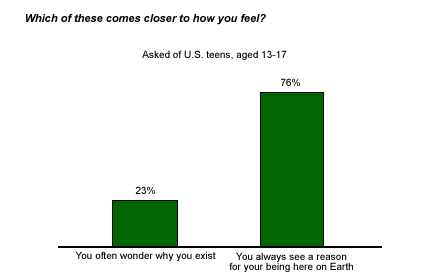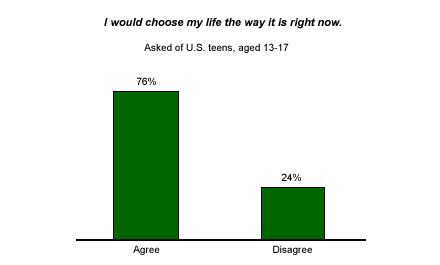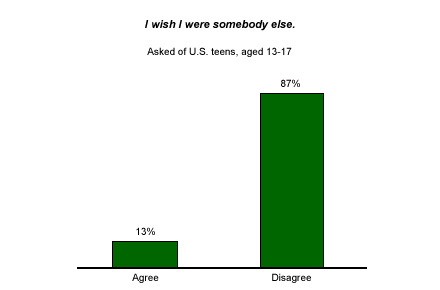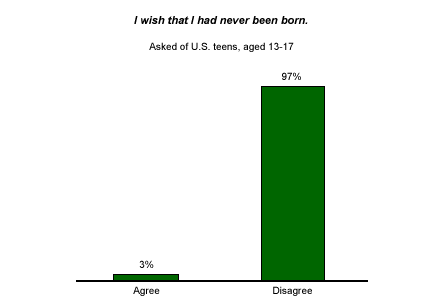Teen-agers are busy. The frenetic activity of school and work, navigating rapid changes in their relationships with parents, teachers, and friends -- it can all seem overwhelming and leave little time to ponder broad, philosophical questions about who they are, why they're here, and what, if anything, they can change. But you may be surprised -- a 2001 Gallup Youth Survey gave teens the chance to respond to some of those questions and turned up insights about how they see the "big picture."
What Are You Doing Here?
In June through September 2001*, Gallup asked teens between the ages of 13 and 17 some of the existential questions that have kept philosophers busy for millennia. The first question had teens pick the view that came closest to their own -- whether they "often wonder why [they] exist," or whether they "always see a reason for [their] being here on Earth." Seventy-six percent of all teens picked the latter response, while 23% said they often wondered. Age didn't seem to have much of an effect on existential confidence. Kids between the ages of 13 and 15 (78%) were about as likely to see a reason for their existence as were 16- and 17-year-olds (73%). However, religion may be providing some answers -- there was a 16-point difference between kids who attended a religious service in the last week (85%) and kids who didn't (69%).

How's Life?
The second question was a bit more complex. Gallup asked kids to agree or disagree with three statements: "I would choose my life the way it is right now," "I wish I were somebody else," and "I wish I had never been born."
Three-quarters (76%) of American kids said they would choose their lives the way they are, which may offer a sense of validation to parents. However, satisfaction tended to be lower among older teens. Eighty-one percent of 13- to 15-year-olds said they would choose their lives as-is, compared with 69% of 16- and 17-year-olds who said the same. This could be seen as an indicator of frustration (something parents of all teens deal with to some degree) -- but it may also point to teens' sense of future possibilities, their own hopes for their future lives.

Thirteen percent of teens wished they were someone else. There was little difference by age -- younger teens (14%) weren't more likely to wish to be someone else than older teens (12%), but teen girls (16%) were slightly more likely to agree with the statement than teen boys (10%).

There is some comfort in the fact that only 3% of teens said they wished they hadn't been born -- although given the United States' longstanding teen suicide problem, that's still 3% too many. Five percent of teen girls agreed with this response compared with just 1% of teen boys.

Bottom Line
It's easy to fret about the number of teens who aren't sure why they exist, wish they had a different life, or wish they had not been born. Thinking about the identity crises of teens can be frightening, because we know that some kids seek answers in dark places. However, there is also reassurance in these numbers. Some teens need help badly, of course. But the vast majority of teens who experience doubt are actually performing the duty of youth -- exploring their world, asking questions, and finding livable answers -- with depth and intelligence.
*Findings are based on telephone interviews with 454 teen-agers, aged 13 to 17, conducted June through September 2001. For results based on this sample, one can say with 95% confidence that the margin of sampling error is ±5%.